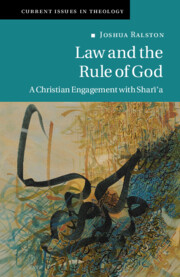Book contents
- Law and the Rule of God
- Current Issues in Theology
- Law and the Rule of God
- Copyright page
- Dedication
- Contents
- Acknowledgments
- Notes on Transliteration and Texts
- 1 Christian Political Theology as Comparative Theology
- 2 Neither Conciliation nor Confrontation
- 3 “That Hideous Schizophrenia”
- 4 The Difficulty with Distinctions
- 5 Building a Christological Legal Foundation
- 6 The Witness of the Law in Comparative Perspective
- Conclusion
- Select Bibliography
- Index
4 - The Difficulty with Distinctions
Justin Martyr, Thomas Aquinas, and Martin Luther on Law
Published online by Cambridge University Press: 28 October 2020
- Law and the Rule of God
- Current Issues in Theology
- Law and the Rule of God
- Copyright page
- Dedication
- Contents
- Acknowledgments
- Notes on Transliteration and Texts
- 1 Christian Political Theology as Comparative Theology
- 2 Neither Conciliation nor Confrontation
- 3 “That Hideous Schizophrenia”
- 4 The Difficulty with Distinctions
- 5 Building a Christological Legal Foundation
- 6 The Witness of the Law in Comparative Perspective
- Conclusion
- Select Bibliography
- Index
Summary
This chapter offers a reexamination of three key figures that developed trajectories of Christian interpretations of Mosaic and later Jewish law, focusing on the distinctions that Justin Martyr, Thomas Aquinas, and Martin Luther each create to interpret scripture’s accounts of law. Early Christian theologians consistently reconsidered the soteriological and moral importance of law, denying it pride of place in the economy of salvation. In contrast, public law was largely addressed through the lens of nature, culture, or creation. Israel’s laws were Christologically rethought, but the civil laws of the nations were by and large left to the realm of natural law. The process of making soteriological distinctions about the law resulted in an anemic account of public law that is highly critical of Israel and Judaism and overly positive on natural law. Even in Thomas’s highly developed theology of the law or in Luther’s instance on the primacy of the gospel, nature remains the governing category for building a Christian understanding of public law. Natural law and by extension public law was thus quarantined from critical interrogation.
Keywords
- Type
- Chapter
- Information
- Law and the Rule of GodA Christian Engagement with Shari'a, pp. 139 - 198Publisher: Cambridge University PressPrint publication year: 2020

